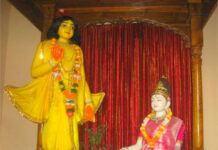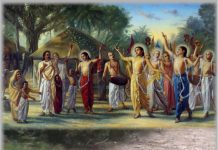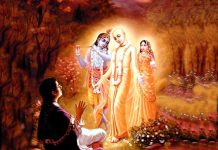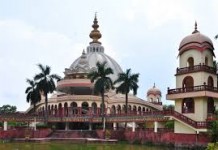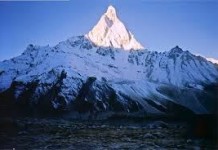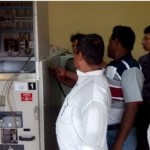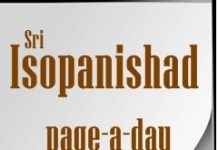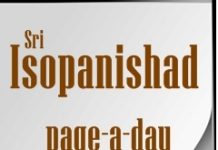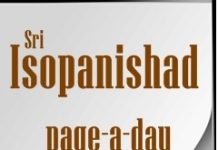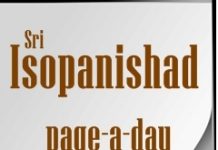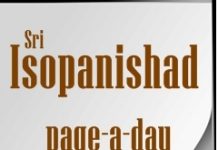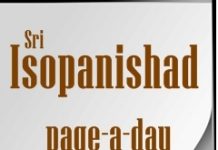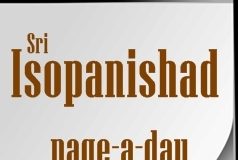Continued from previous page… Srila Prabhupada explains how the archa-vigraha, or a deity form of the Lord, is also an expansion of the Lord just like His other innumerable expansions.

In the Brahma-samhita (5.1) there is a similar description of the Supreme Lord. He is described there as sac-chid-ananda-vigraha, which means that He is the eternal form fully representing transcendental existence, knowledge and bliss. As such, He does not require a separate body or mind, as we do in material existence. The Vedic literature clearly states that the Lord’s transcendental body is completely different from ours; thus He is sometimes described as formless. This means that He has no form like ours and that He is devoid of a form we can conceive of.
In the Brahma-samhita (5.32) it is further stated that with each and every part of His body He can do the work of the other senses. This means that the Lord can walk with His hands, accept things with His legs, see with His hands and feet, eat with His eyes, etc. In the sruti-mantras it is also said that although the Lord has no hands and legs like ours, He has a different type of hands and legs, by which He can accept all that we offer Him and run faster than anyone. These points are confirmed in this eighth mantra through the use of words like sukram (“omnipotent”).
The Lord’s worshipable form (archa-vigraha), which is installed in temples by authorized acharyas who have realized the Lord in terms of Mantra Seven, is nondifferent from the original form of the Lord. The Lord’s original form is that of Sri Krishna, and Sri Krishna expands Himself into an unlimited number of forms, such as Baladeva, Rama, Nrisimha and Varaha. All of these forms are one and the same Personality of Godhead. Similarly, the archa-vigraha worshiped in temples is also an expanded form of the Lord. By worshiping the archa-vigraha, one can at once approach the Lord, who accepts the service of a devotee by His omnipotent energy.
The archa-vigraha of the Lord descends at the request of the acharyas, the holy teachers, and works exactly in the original way of the Lord by virtue of the Lord’s omnipotence. Foolish people who have no knowledge of Sri Isopanishad or any of the other sruti-mantras consider the archa-vigraha, which is worshiped by pure devotees, to be made of material elements. This form may be seen as material by the imperfect eyes of foolish people or kanishtha-adhikaris, but such people do not know that the Lord, being omnipotent and omniscient, can transform matter into spirit and spirit into matter, as He desires.
In the Bhagavad-gita (9.11-12) the Lord regrets the fallen condition of men with little knowledge who deride Him because He descends like a man into this world. Such poorly informed persons do not know the omnipotence of the Lord. Thus the Lord does not manifest Himself in full to the mental speculators. He can be appreciated only in proportion to one’s surrender to Him. The fallen condition of the living entities is due entirely to forgetfulness of their relationship with God.
In this mantra, as well as in many other Vedic mantras, it is clearly stated that the Lord has been supplying goods to the living entities from time immemorial. A living being desires something, and the Lord supplies the object of that desire in proportion to one’s qualification. If a man wants to be a high-court judge, he must acquire not only the necessary qualifications but also the consent of the authority who can award the title of high-court judge. The qualifications in themselves are insufficient for one to occupy the post: it must be awarded by some superior authority. Similarly, the Lord awards enjoyment to living entities in proportion to their qualifications, but good qualifications in themselves are not sufficient to enable one to receive awards. The mercy of the Lord is also required.
Ordinarily the living being does not know what to ask from the Lord, nor which post to seek. When the living being comes to know his constitutional position, however, he asks to be accepted into the transcendental association of the Lord in order to render transcendental loving service unto Him. Unfortunately, living beings under the influence of material nature ask for many other things, and they are described in the Bhagavad-gita (2.41) as having divided, or splayed, intelligence. Spiritual intelligence is one, but mundane intelligence is diverse.
(To continue read the next page…)
Source: Sri Isopanishad. Translation and purports by His Divine Grace A.C.Bhaktivedanta Swami Prabhupada. Copyright BBT International http://www.vedabase.com/en/iso


